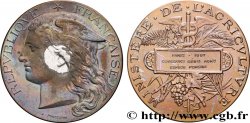fme_587174 - III REPUBLIC Médaille parlementaire, XVIe législature, Pierre Béranger
Not available.
Item sold on our e-shop (2022)
Price : 200.00 €
Item sold on our e-shop (2022)
Price : 200.00 €
Type : Médaille parlementaire, XVIe législature, Pierre Béranger
Date: 1936
Mint name / Town : 27 - Eure
Metal : silver
Millesimal fineness : 850 ‰
Diameter : 49,5 mm
Orientation dies : 12 h.
Engraver MONIER Émile Adolphe (1883-1970)
Weight : 66,26 g.
Edge : lisse + corne d’abondance 2ARGENT
Puncheon : Corne 2 ARGENT
Rarity : R3
Coments on the condition:
Exemplaire ayant été nettoyé et présentant plusieurs coups et rayures, en particulier sur le visage de la République
Obverse
Obverse legend : REPUBLIQVE - FRANÇAISE.
Obverse description : Tête de la République à droite portant un bonnet ; au-dessous .EMILE MONIER. 1936..
Reverse
Reverse legend : .CHAMBRE - DES DEPVTES. // LIBERTE. EGALITE. FRATERNITE.
Reverse description : Lion couché à droite reposant sur un cartouche ; au-dessous 1936, en arrière-plan la façade de l’Assemblée nationale (Palais Bourbon) et la signature E.M. Sur le cartouche est inscrit en reliefs en deux lignes PIERRE BÉRANGER / EURE.
Commentary
Médaille attribuée en 1936 à Pierre, Vincent, Émile Béranger, député de l’Eure. Il naquit le 26 juin 1888 à Paris et y décéda le 20 mars 1967. Il fut élu député de l’Eure en 1936 sous l’étiquette de l’Alliance démocratique dont il fut vice-président et trésor de 1928 à 1940. L’essentiel de ses travaux parlementaires portèrent sur l’agriculture et l’aviation. Son mandat de député fut prolongé jusqu’au 31 mai 1942 suis à un décret de juillet 1939 touchant tous les députés élus en mai 1936. Le 10 juillet 1940 il vota les pleins pouvoirs au maréchal Pétain, mettant fin à sa carrière politique après la libération. Blessé à quatre reprises pendant la guerre de 1914-1918 dans laquelle il s’était engagé en tant que fantassin puis aviateur, il a été décoré de la Croix de guerre et de la croix d’officier de la Légion d’honneur.
Medal awarded in 1936 to Pierre, Vincent, Émile Béranger, deputy of Eure. He was born on June 26, 1888 in Paris and died there on March 20, 1967. He was elected deputy of Eure in 1936 under the label of the Democratic Alliance of which he was vice-president and treasurer from 1928 to 1940. The main part of his parliamentary work focused on agriculture and aviation. His mandate as deputy was extended until May 31, 1942 following a decree of July 1939 affecting all the deputies elected in May 1936. On July 10, 1940 he voted for full powers to Marshal Pétain, ending his political career after the liberation. Wounded four times during the 1914-1918 war in which he fought as an infantryman and then as an aviator, he was decorated with the Croix de Guerre and the Officer's Cross of the Legion of Honour.
Medal awarded in 1936 to Pierre, Vincent, Émile Béranger, deputy of Eure. He was born on June 26, 1888 in Paris and died there on March 20, 1967. He was elected deputy of Eure in 1936 under the label of the Democratic Alliance of which he was vice-president and treasurer from 1928 to 1940. The main part of his parliamentary work focused on agriculture and aviation. His mandate as deputy was extended until May 31, 1942 following a decree of July 1939 affecting all the deputies elected in May 1936. On July 10, 1940 he voted for full powers to Marshal Pétain, ending his political career after the liberation. Wounded four times during the 1914-1918 war in which he fought as an infantryman and then as an aviator, he was decorated with the Croix de Guerre and the Officer's Cross of the Legion of Honour.








 Report a mistake
Report a mistake Print the page
Print the page Share my selection
Share my selection Ask a question
Ask a question Consign / sell
Consign / sell
 Full data
Full data









